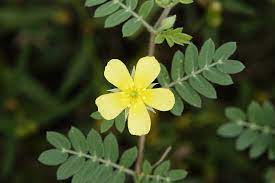Disclaimer: This Materia Medica is provided for informational purposes only and should not replace professional medical advice. Please consult with a qualified healthcare practitioner or herbalist before using any herbal remedies.
Tribulus terrestris, commonly known as puncture vine or goat’s head, is a plant that has been used in traditional herbal medicine for centuries. As a professional herbalist, I’ll provide you with an exhaustive Materia Medica for Tribulus terrestris, covering its botanical description, historical use, medicinal properties, preparation methods, dosages, and potential side effects.
Botanical Description:
- Family: Zygophyllaceae
- Genus: Tribulus
- Species: terrestris
- Common Names: Puncture vine, Goat’s head, Caltrop, Gokshura (Sanskrit)
Tribulus terrestris is a small, low-growing, annual plant that is native to regions of Asia, Europe, and Africa. It is characterized by its prostrate stems, pinnate leaves, and distinctive fruit that consists of sharp, spiky seed pods, often called “goat’s heads” due to their appearance.
Historical Use: Tribulus terrestris has a rich history of use in various traditional medicine systems, including Ayurveda and Traditional Chinese Medicine (TCM). It has been employed for a wide range of health-related purposes, including:
- Libido Enhancement: Tribulus has been traditionally used as an aphrodisiac and to improve sexual function in both men and women.
- Strength and Vitality: It was believed to increase physical strength, energy, and vitality.
- Urinary Health: In Ayurveda, it has been used to support urinary health and as a diuretic.
- Cardiovascular Health: Some traditional uses include support for heart health and as a general tonic for the circulatory system.
- Hormonal Balance: Tribulus has been used to regulate hormonal imbalances, particularly in women.
Medicinal Properties: Tribulus terrestris contains various bioactive compounds, including saponins, flavonoids, alkaloids, and steroidal compounds. These compounds are responsible for its medicinal properties, which may include:
- Adaptogenic: Tribulus may have adaptogenic properties, helping the body adapt to stress and maintain overall balance.
- Aphrodisiac: It is widely known for its potential to enhance libido and sexual function in both men and women.
- Anti-inflammatory: Some studies suggest that tribulus extracts may possess anti-inflammatory properties.
- Antioxidant: The plant’s antioxidants may help protect cells from oxidative damage.
Preparation Methods: Tribulus terrestris can be prepared and administered in various forms, including:
- Decoction: Boil the dried fruits or aerial parts in water to make a decoction, which can be consumed as a tea.
- Tincture: Prepare a tincture using the dried or fresh plant material and alcohol, allowing it to macerate for several weeks.
- Powder: Dried plant material can be ground into a powder and encapsulated for easy dosage.
- Infusion: Infuse the dried or fresh plant parts in hot water to make a mild herbal tea.
Dosages: Dosages can vary based on the preparation and individual needs. As a general guideline:
- Dried herb (as a tea): 1-2 grams per day.
- Tincture: 2-3 ml, 2-3 times per day.
- Powder (in capsules): 250-500 mg, 2-3 times per day.
It’s important to consult with a qualified herbalist or healthcare practitioner to determine the appropriate dosage for your specific situation.
Potential Side Effects: Tribulus terrestris is generally considered safe when used in moderate doses. However, some individuals may experience side effects, including:
- Gastrointestinal upset
- Changes in mood or irritability
- Increased body temperature
Pregnant or nursing women, as well as individuals with certain medical conditions, should consult a healthcare professional before using tribulus supplements.
In conclusion, Tribulus terrestris is a versatile herb with a long history of traditional use. While it is popular for its potential benefits related to libido and sexual health, it also offers other medicinal properties that make it a valuable herb in herbal medicine systems worldwide. As with any herbal remedy, it’s essential to use Tribulus under the guidance of a qualified herbalist or healthcare provider to ensure safe and effective usage.





